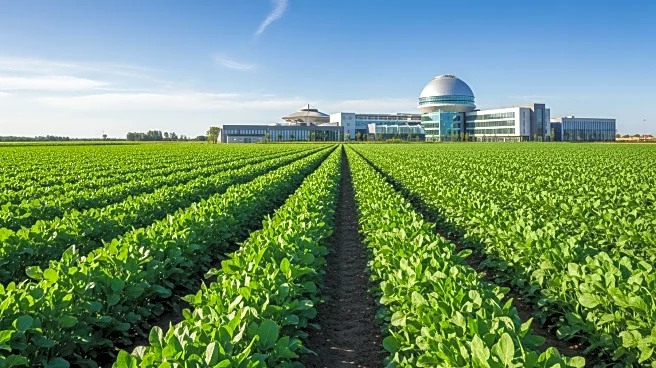What is the story about?
What's Happening?
The Islamic Development Bank (IsDB) and the Consultative Group on International Agricultural Research (CGIAR) have partnered to accelerate the transformation of Africa's food systems. This collaboration was highlighted at the Africa Food Systems Forum 2025 in Dakar, Senegal, where discussions focused on leveraging science-driven solutions, co-financing, and government partnerships to enhance food security and sustainability across the continent. Key figures such as Dr. Namukolo Covic and Dr. Stanford Blade led discussions on transforming value chains and scaling science-based solutions. The event emphasized the importance of innovation, research, and multi-stakeholder collaboration in reshaping food systems.
Why It's Important?
The partnership between IsDB and CGIAR is significant as it aims to address food security challenges in Africa, a continent that faces persistent issues related to hunger and agricultural inefficiencies. By focusing on science-driven solutions and strategic partnerships, this initiative seeks to create resilient and inclusive food systems that can withstand climate change and economic pressures. The collaboration also highlights the role of young leaders and innovators in driving agricultural advancements, potentially leading to increased youth employment and economic growth in agribusiness sectors.
What's Next?
The session concluded with a call to action for governments, investors, and innovators to scale proven solutions and accelerate Africa's journey toward resilient and sustainable food systems. The expected outcomes include strengthened commitments from governments and financiers, broader awareness of successful innovation models, and renewed momentum for youth engagement in agribusiness. Future steps may involve further collaboration with multilateral partners and alignment of programs with national priorities to ensure the effective implementation of these strategies.
Beyond the Headlines
The initiative underscores the ethical and cultural dimensions of food security, emphasizing the need for inclusive approaches that consider the diverse needs of African communities. It also highlights the long-term potential for transforming agricultural practices through technology and innovation, which could lead to significant shifts in regional trade and economic stability.

















